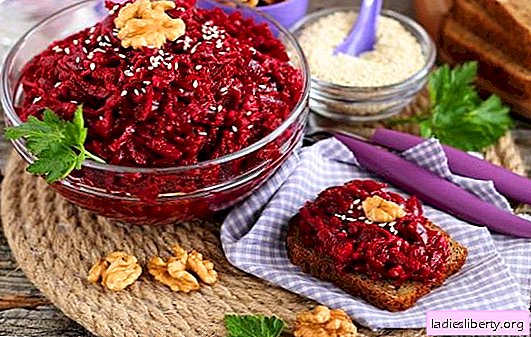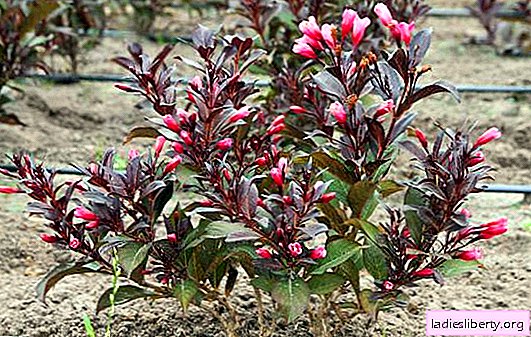
Rosehip - a perennial shrub with burgundy dense berries. Decoctions, teas, infusions on rose hips - one of the most popular health remedies in folk medicine. Useful properties of rose hips are used to combat various ailments.
The composition of rose hips
In the composition of wild rose berries, scientists found a record amount of ascorbic acid (vitamin C): 14%. In blackcurrant, for example, it is many times less. In addition, the fruits contain such substances:
• B vitamins, including thiamine, riboflavin, folic acid;
• vitamins PP, E, K, A;
• tannins and tannins;
• organic acids (citric and malic);
• trace elements (calcium, potassium, phosphorus, magnesium, glands, copper, zinc, manganese);
• cellulose;
• pectins.
All of these substances give rosehips benefits and real healing power. Thiamine (Vitamin B1) is necessary for the proper functioning of the nervous, cardiovascular, digestive system. Riboflavin (B2) ensures the full functioning of the thyroid gland, strengthens hair and nails, participates in the synthesis of antibodies and red blood cells. Folic acid and tocopherol (vitamin E) are indispensable for normalizing the reproductive functions of the female and male body, and their deficiency leads to the development of anemia and a decrease in the body's immune defense.
The combination of ascorbic acid and vitamin P strengthens the capillaries, ensures the correct course of redox processes. Due to the successful combination of vitamins K and D, rosehip normalizes metabolic processes in the connective and bone tissue, has a beneficial effect on the kidneys and ensures normal blood coagulation.
The tannins and tannins that the rosehip is rich in contribute to the formation of a special protective film on the skin and mucous membranes as a result of coagulation of proteins. It is this useful property of wild rose that is used in the treatment of burns, skin diseases, inflammation of the oral mucosa.
Useful properties of rose hips
The rosehip is so great that official medicine includes it in the treatment plan for various ailments. The healing properties of the fruits of prickly shrubs are known and well studied: restorative, anti-inflammatory, anti-sclerotic, choleretic, soothing.
Decoctions and infusions on rosehip berries, as well as rosehip oil are used to treat various diseases:
• diseases of the heart and blood vessels;
• hypertension;
• flu, SARS, colds;
• tonsillitis, tonsillitis;
• runny nose, sinusitis;
• diseases of the gastrointestinal tract, including stomach ulcer;
• liver diseases, as well as cholecystitis, hepatitis and cholangitis;
• atherosclerosis, vascular diseases;
• uterine, pulmonary bleeding;
• hemorrhagic diathesis;
• impotence;
• BPH;
• eye diseases, including nictalopia (twilight vision disorder);
• skin diseases, including ulcers, bedsores, dermatitis;
• depression, insomnia, nervous disorders;
• vitamin deficiency.
With the help of wild rose, atherosclerosis and heart attack can be prevented. A decoction of a berry-healer restores the elasticity of blood vessels, stimulates blood formation. Decoctions and teas with wild rose relieve weakness, increase efficiency, and facilitate colds. On the male body, rosehip acts as a tool that increases potency and cures prostate adenoma.
Rinsing with a rosehip infusion not only heals microtraumas of the oral mucosa, but in combination with a mint leaf can also get rid of halitosis (bad breath).
Rosehip berries are processed in an industrial way, producing oils, syrups, preparations of vitamin C (ascorbic acid). Rosehip oil can be used both externally and internally. It accelerates the processes of tissue regeneration, heals the mucous membrane of the esophagus, enhances the production of hormones.
Rosehip does not bring harm to external use, but it can with internal use. Therefore, you should make sure that there are no contraindications to the dog rose before you start using it for medicinal purposes.
How to brew a rosehip
At home, you can brew rosehips as regular tea, make an infusion of berries, add to regular tea when brewing as a vitamin supplement. Before use, dried berries should be washed and chopped: grind in a mortar, cut with a knife, chop in a meat grinder. Crushed fruits will give more vitamins than whole ones.
Fortifying Tea
To brew dried rosehips, you need to take 2 tbsp. In a glass of boiling water l raw materials, simmer for about ten minutes with a slight boil, and then let the drink brew for another fifteen minutes. Such tea can be sweetened with honey and drunk as desired up to four times a day.
You can make a drink differently. Pour 100 g of raw material with a liter of water, heat until boiling, simmer for five minutes. Then wrap the container with broth well and insist for at least an hour. Strain, drink with honey and lemon.
Liver infusion
To treat a diseased liver, a healing infusion is prepared differently. At night 1 tbsp. l dried berries need to be crushed, sent to a thermos and brew ½ liter of boiling water. In the morning, drink a glass of strained infusion on an empty stomach, after half an hour, drink a second glass. After another half hour, have breakfast with light-calorie light dishes - vegetable salad, herculean porridge, cooked on water, yogurt.
Treatment is carried out by a course. In total, you need to drink the infusion for six days, but take a two-day break between meals.
Kissel on starch
A delicious and very useful jelly from dried rosehip berries is indicated for gastrointestinal diseases. 100 grams of dried raw materials (necessarily chopped) should be poured 2 liters of water, simmer for 15 minutes with a slight boil, strain. Dilute 50 g of starch with cold water, pour into a rosehip broth. Bring jelly to a boil, add 1 tbsp. l lemon juice (or as much diluted citric acid) and sugar to taste.
Fresh rose hips can also be used to prepare decoctions and infusions. However, you can make other drinks and even desserts with it: syrups, fruit drinks, punch, jelly, jam, marmalade.
Fresh Berry Syrup
Prepare sugar syrup by dissolving a pound of sugar in a liter of water. Cut washed rosehip berries, select seeds and hairs, throw in syrup and leave overnight. After 11 hours, pick berries, arrange in banks. Boil the syrup for about three minutes, then pour the berries on it. Pasteurize jars in boiling water for 15-20 minutes (depending on volume), seal.
You can make syrup by adding sea buckthorn berries to the dogrose. This will result in an even more useful product.
Fresh Berry Infusion
A pound of wild rose berries pour 2 liters of hot boiling water, cover. When the infusion has cooled, add sugar to taste, 3 tbsp. l raisins. Remove to insist for three days in a cold place. Drink strained.
Contraindications for the use of rose hips
Despite the healing power of burgundy berries, not all people can drink rose-based drinks. Contraindications are as follows:
• cholelithiasis;
• gastritis with increased acidity of gastric juice;
• endocarditis;
• thrombophlebitis;
• dystrophic stage of heart failure;
• pregnancy.
For pregnant women, the harm of rose hips is that the flesh of the berry contains too much ascorbic acid. This is fraught with miscarriage. Too acidic environment damages tooth enamel, so it is advisable to drink rosehip infusions through straws for cocktails, and then rinse your teeth.
Abuse of rosehip infusions leads to migraines, pain in the stomach, muscles and liver, the appearance of weakness in the legs. If you drink it for too long, without giving the body an unloading, there will be stagnation in bile, constipation, and insulin production will decrease.











